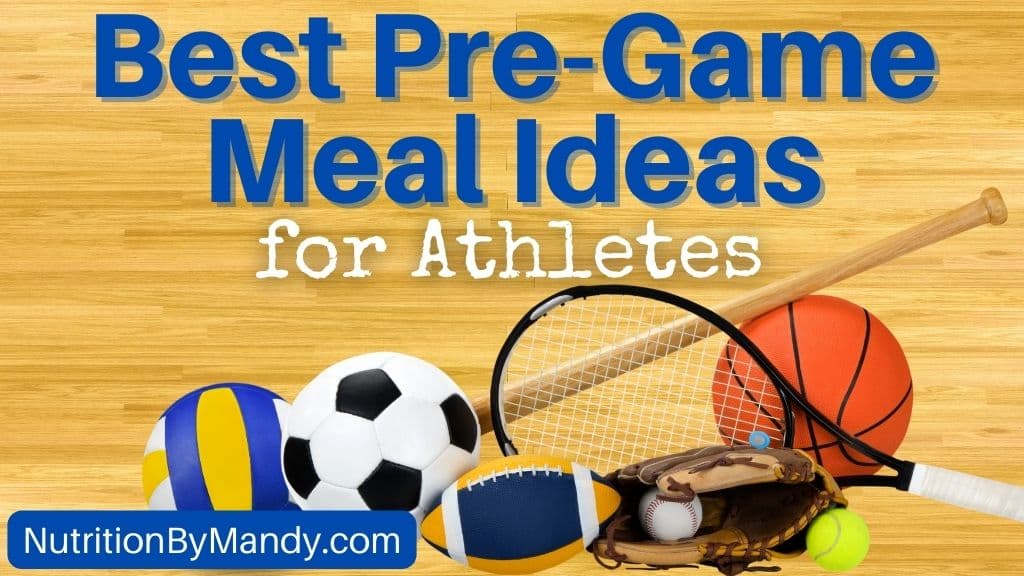Last Updated on January 22, 2024 by Mandy Tyler, M.Ed., RD, CSSD, LD
Best Pre-Game Meal Ideas for Athletes
Eating a well-planned pre-game meal can help ensure athletes are fueled to perform at their best in the upcoming competition.
Equipping athletes with ideas for the best pre-game can help set them up for sports nutrition success.
Timing of the Pre-Game Meal
Prior to looking at what to eat with your pre-game meal, let’s discuss the ideal timing for eating before competition. Eating too much food, too close to your event may result in an upset stomach during the game.
When is the Best Time to Eat Your Pre-Game Meal?
When possible, schedule your pre-game meal to be eaten 3-4 hours prior to the competition. This allows time for your body to digest and for you to go to the bathroom if needed before the start of the event.
As the start time of the competition gets closer, you can continue fueling with a mini-meal or pre-game snack.
Consuming a high-carbohydrate snack in the hour before activity can help provide an extra boost of energy for the upcoming competition.

Pre-Game Meal Nutrient Needs
The foundation of an athlete’s pre-game meal should be carbohydrates. Carbohydrates provide athletes with the energy needed to perform at their best.
Building a pre-game meal centered around carbohydrates can help ensure athletes are well fueled for the upcoming event.
What are Ways for Athletes to Get Carbohydrates with the Pre-Game Meal?
Athletes can add carbohydrates to their pre-game meal with foods from the following food groups:
- Fruit: Fresh, frozen, dried, canned (natural juices)
- Starchy Vegetables: Potatoes, corn, peas
- Grains: Bread, cereal, oatmeal, rice, pasta, quinoa
- Dairy: Milk, yogurt
If you are looking for gluten-free carbohydrates to enjoy as part of your pre-game meal, take time to read my blog: Gluten-Free Pre-Workout Meals and Snacks for Athletes.

Additional Nutrients with the Pre-Game Meal
In addition to carbohydrates, athletes can include a moderate amount of lean protein with their pre-game meals.
Potential protein sources to enjoy with the pre-game meal include:
- Seafood and fish
- Chicken and turkey (without skin)
- Lean cuts of red meat and pork
- Eggs
- Deli meat
- Greek yogurt
- Cottage cheese
- Tofu
- Nuts and nut butters
When considering the preparation method of proteins to enjoy with your pre-meals, choose items that are grilled, baked, roasted, or steamed rather than deep fried. Fried foods tend to be high in saturated fat, thus they are not an ideal choice prior to a game.
Foods to Limit in the Pre-Game Meal
In addition to know the best foods to include in a pre-game meal, it is important for athletes to know what foods to avoid as well.
In the hour or two prior to competition, athletes should limit foods that are high in fat, fiber, and/or protein. Consuming these foods too close to the start of activity may lead to GI distress during the game (1).
This includes foods such as:
- Fried or greasy foods
- Heavy cream, cheese, or buttery sauces
- Dessert foods (ice cream, brownies, fudge)
- Beans and legumes
- High-fiber vegetables (cauliflower, broccoli, Brussels sprouts, cabbage)
- Whole grains (high-fiber)

Some individuals also feel better when they limit foods containing lactose (i.e. milk, yogurt) as well as spicy foods (hot sauce, jalapenos) prior to competition. Since every athlete is unique, it is important to find the foods that work best for you.
Best Pre-Game Meal Ideas
Putting this all together, here are a variety of pre-game meal ideas for athletes.
- Scrambled eggs, pancakes, and fresh sliced fruit
- French toast, turkey sausage, banana
- Fruit smoothie, bagel with nut butter and honey
- Grilled chicken breast, roasted potato wedges, green beans, dinner rolls
- Pasta with marinara (tomato sauce), turkey meatballs, and vegetables, breadsticks
- Roasted salmon filet, baked sweet potato, fresh mixed berries, corn muffin
- Grilled pork loin chop, steamed rice, whole kernel corn, dinner rolls
- Turkey and ham sub sandwich, pretzels, apple slices
For additional plant-based options, check out my blog: How to Build an Ideal Vegan Pre-Workout Meal.
Best Pre-Game Mini-Meal Ideas
When planning your pre-game nutrition strategy, remember that as you get closer to the start time of the game, the size of the pre-game meal you eat should decrease.
In addition, as you get closer to the start of the game, your focus should be on consuming carbohydrates for energy.
When athletes have less time before the start of a game (~2 hours), they can enjoy a high-carb mini-meal. The mini-meal should include a food that provides a good source of carbohydrates paired with a food providing lean protein.
Pre-game mini-meal ideas include:
- Peanut butter and jelly sandwich
- Fig bars with string cheese
- Fruit smoothie
- Fruit and yogurt parfait with berries and granola
- Granola bars with nut butter and a banana
- Turkey wrap and grapes
Then in the hour before the start of the game, I recommend athletes consume high-carb pre-game snacks that will provide them with a quick source of energy for the upcoming competition.

What About Pre-Game Hydration?
When you are planning your pre-game meal, don’t forget about the importance of hydration.
Dehydration can negatively impact an athlete’s health as well as sports performance. Therefore, starting the game in an optimally hydrated state is important.
Pre-Game Hydration Tips
Although hydration needs vary amongst individuals, there are some general pre-event guidelines athletes can follow.
Approximately 4 hours prior to the event, it is recommended that athletes drink 5-7 mL of fluid per kg of body weight (2). For a 180-pound athlete, this calculates to be ~14 – 19 fluid ounces.
Thus, in general, consuming approximately 2 cups of fluid with your pre-game meal can assist you with meeting this goal.
In the hour leading up to the event, athletes should continue hydrating, aiming to drink around 8 oz of fluid during this time period.
Consuming foods that contain sodium with the pre-game meal, such as deli meat, cheese, and soup, can help your body with retaining the fluid you drink prior to competition (1).

What About Caffeine with the Pre-Game Meal?
Athletes commonly ask about consuming caffeine prior to competition in an effort to increase alertness, reduce feelings of perceived effort, or to assist with competing at a higher intensity.
In the hour before exercise, typical caffeine recommendations are for athletes to consume 3-6 mg of caffeine per kg of body weight (3).
Keep in mind that when it comes to caffeine, more is not better. Consuming too much caffeine before activity can lead to undesirable outcomes.
Higher doses of caffeine (≥9 mg/kg body weight) increases the risk of side effects, such as jitters, anxiety, and nausea, and does not provide an increased performance benefit (3).
While these are general guidelines, be aware that there are individual variations in how athletes metabolize and respond to caffeine intake (4).
Some athletes may find a benefit from a lower dose of caffeine or have undesired side effects from consuming even small amounts of caffeine before activity.
Best Pre-Game Meals at Restaurants
If you are traveling and need to eat your pre-game meal at a restaurant, you can follow the same guidelines shared above to create a great pre-event meal.
Example pre-game meals at restaurants may include:
- Breakfast (Panera Bread): Egg white breakfast sandwich, Greek yogurt with mixed berries parfait, fresh fruit cup
- Mexican Food (Chipotle): Burrito bowl made with grilled chicken, rice, corn salsa, lettuce, tomatoes, and a tortilla on the side
- American Food (Chili’s): Grilled chicken or grilled chicken sandwich, rice, corn on the cob
- Sandwich Shop or Deli (Jason’s Deli): Turkey sandwich, fresh sliced fruit cup, chicken noodle soup, baked chips
- Steak House (Texas Roadhouse): Grilled salmon or chicken, baked potato, green beans, dinner roll
- Asian Food (Pei Wei): Beef and broccoli, steamed white rice, and wonton soup
- Mediterranean Food (CAVA): Grain bowl with grilled chicken, rice, roasted corn, veggies, and pita bread
- Italian Food (Maggiano’s): Pasta with marinara (red sauce) grilled chicken or shrimp and Italian vegetables, pasta fagioli soup, and bread sticks
Practice Your Pre-Game Meal
Since athletes vary on foods they tolerate prior to activity, it is important to take time to figure out what foods work best.
Practicing your pre-game fueling strategy in advance can help you have confidence during the competition that you are fueled to perform at your best.

Ready for Game Day
You are now set with a variety of ideas for building the best pre-game meal. Taking time to plan your meal in advance can help set you up for sports nutrition success on game day.
For additional sports nutrition tips for athletes, check out my blog: Healthy Bus Snacks for Athletes.
Join the Nutrition By Mandy Email List & Get a Free Athlete’s Grocery List
Click HERE to join the Nutrition By Mandy e-mail list. When you join you will receive a free athlete’s grocery list to print and take with you to the store.
About the Author
Mandy Tyler is a Sports Dietitian Nutritionist in the San Antonio, TX area. She is a Registered and Licensed Dietitian, a Board-Certified Specialist in Sports Dietetics, a Licensed Athletic Trainer, and is a Certified Exercise Physiologist through the American College of Sports Medicine. Mandy has experience working with athletes at the high school, collegiate, and professional levels. She believes the key to reaching one’s full potential, both in everyday life and in sports performance, relies on a healthy nutritional foundation.





